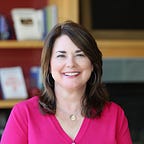Story As Political Act
Storytellers are a threat. They threaten all champions of control, they frighten usurpers of the right-to-freedom of the human spirit — in state, in church or mosque, in a party, congress, in the university or whatever. That’s why. — Chinua Achebe
Stories have a unique power. They entertain even as they reveal truth. Joan Didion said that we tell ourselves stories in order to live. I would amend that to say that we, as teachers, must tell our stories in order that our students and our work may live in the public imagination.
Especially now when language has been weaponized in service of power.
George Orwell was obsessed with this same idea. I taught his essay “Politics And The English Language” to my AP juniors, and it seems to grow more relevant every year.
Political language, according to Orwell, “is designed to make lies sound truthful and murder respectable, and to give an appearance of solidity to pure wind.”
In Texas, we are hip deep in the kind of obfuscation best stepped over in a feedlot. Our lieutenant governor labels any teacher who dares to speak against the disastrous A-F grading system, itself a feat of political language, “educrats.” His plan to move tax dollars away from the kinds of schools I taught in, all Title I and serving the most vulnerable children, to private and for profit schools is “school choice.”
Most deceptively, he uses civil rights language to frame this scheme to bleed money from the schools who serve predominately minority students, shedding crocodile tears for “the most underprivileged in our state.”
That’s his story. And make no mistake that he is the hero in all of them. Just like our President, who casts himself as the hero of a thousand huge deeds. In his world, everyone who doesn’t flatter and fawn over him is a loser.
That’s quite the story.
But I have one too.
In October, I joined ten of my colleagues in signing an open letter opposing the candidacy of Donald Trump because “Children are watching. They are listening. They are learning from the example we set as their parents and teachers — not only from what we say and do, but from what we accept when it comes to the words and actions of others. We have to show them that hatred, sexism, racism, disrespect, and threats of physical violence are not okay. They’re unacceptable at any age — for a kindergartener, a high school student, or a presidential candidate.”
People don’t like the term political, (and they sure don’t like it when a teacher voices a political opinion outside of class), but the root of the term simply means community.
As teachers, we represent our physical communities, but our most vital communities are those of our classrooms and campuses. In a sense, we are like Dr. Seuss’s The Lorax, who famously “spoke for the trees because the trees have no tongues.” Similarly, teachers speak for those who are are not only politically voiceless, but are also some of the most vulnerable members of our society — children.
We need to be the ones telling our stories. Stories, in this regard, are a political decision because who we decide to speak about is who we are deciding to speak for.
And it can be scary to speak up. Fear, says author Seth Godin, “almost never goes away if you will it to, and it’s rarely a useful tool for your best work.” That fear can paralyze one of our most vital tools: our voice. If we simply maintain the status quo out of fears of being seen as difficult or impolite, then we are neglecting not only our classroom communities, but the wider communities we serve.
Some of us find ourselves at parties where people make racist jokes, share insulting comments about low-income families, or express ignorant opinions about immigrants. We must resist any narrative, whether it pops up in casual conversations at the grocery store or inside the office of an elected representative, that aims to make the families of our students “other.”
For teachers, it’s never “those kids” or “those people.” They are our kids, our students’ families, our colleagues — not “us” and “them.”
The good news about stories is that they create hope. And hope, Godin says, actively dissolves fear. “Hope…can be conjured. It arrives when we ask it to, it’s something we can give away to others again and again, and we can use it to build something bigger than ourselves.”
One of the most pernicious sentences I hear is a variation of: “I can’t do_____(fill in the blank), I’m just a teacher.”
But I believe that only a teacher can do the kinds of advocacy our students need. Because I was “just a teacher,” I was invited to speak to both the Israeli and the Palestinian ministers of education, the Governor and the Chairmen of the Education committees in my state house, and my state board of education.
You are not “just a teacher.” You are a warrior. Your sword is forged from every success you’ve ever had, every problem you’ve solved, every child you’ve helped. You are a stabilizing force for good, a fierce promoter and protector of our democracy.
Your stories are your sword. Your love is your shield.
For so many children, you are the difference between hope and despair. For so many teachers, you are the model of what a warrior teacher looks like, sounds like. To paraphrase an ancient text: “And who knows whether you have not become a teacher for such a time as this?”
This is your time. This is your task. If I were the tattooing type, I would tattoo these words from William Wordsworth on the inside of my arm:
[A version of this post appeared in the September/October 2016 issue of Literacy Today]
